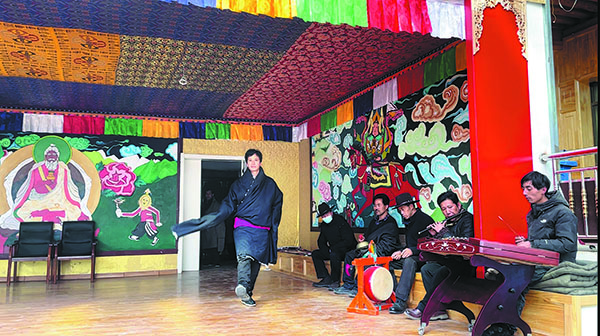Tibetan opera takes center stage in Gansu village's New Year festivities
From:China DailyAuthor: 2024-03-04 11:08

The Wem village Namtar opera troupe rehearses for upcoming performances.[Photo provided to China Daily]
In a medium-sized courtyard in Wem village in the Gannan Tibet autonomous prefecture in Northwest China's Gansu province, residents are busy putting up colorful bunting and cleaning a stage. The stage, which stands about a meter high, is enclosed on three sides by walls adorned with paintings of various characters, and will serve as a matching backdrop for the upcoming performances of Namtar Tibetan opera.
Namtar, or rnam thar, is like a form of religious biography in Tibetan Buddhism.
It is fair to say that the new year celebrations in Wem village wouldn't be complete without these performances, since watching them on the 12th and 13th days of the first lunar month has been a cherished tradition for decades.
"I recall watching Namtar opera on these two days since I was 11.Back then, people from neighboring regions would travel to our village on horseback or by motorcycle for the show," says Drugyal, a 57-year-old audience member.
Geographical factors may explain the origin of this tradition. Wem is only about half an hour's drive from the Sangchu county's Labrang Monastery, the birthplace of Namtar opera.
Inspired by Tibetan opera, in the 1940s, the Sixth Jamyang Living Buddha of the Labrang Monastery asked Living Buddha Lang Tsang and other esteemed monks at the monastery to come up with scripts based on history and Buddhist stories. Thus, a unique type of Tibetan opera, Namtar opera, gradually evolved, according to Tsegon Kyab, director of the Sangchu Cultural Center.
"Unlike Tibetan opera, Namtar opera shares some similarities with Peking Opera in terms of the stage, costumes, and accompanying instruments. This is because Living Buddha Lang Tsang maintained communication with the renowned Peking Opera artist Mei Lanfang," says Tsegon Kyab.

The Namtar opera troupe from the Nyingma-school Temple at the Labrang Monastery performs for free during Lunar New Year celebrations.[Photo provided to China Daily]
Apart from the orthodox Namtar opera troupe from the Nyingma-school Temple at the Labrang Monastery, there are 30 local troupes in Gannan, with almost half of them in Sangchu county, including the Wem village Namtar opera troupe.
Bande Tsering, leader of the village's troupe, started to learn Namtar opera in his teens. He began by playing minor roles and eventually progressed to playing leading roles in his 20s.
"The characters that have left a lasting impression on me are the butler, the minister in Atag Lhamo and the prince in Drime Kunden. While the first is a minor role, the last two are lead roles. Playing lead roles signifies that one has completed the learning process," he says.
Around the same time that he started playing lead roles, Bande Tsering was appointed head of the troupe by his teacher. Since then, he has been responsible for organizing rehearsals and performances, selecting and training troupe members.
The troupe now has about 40 members, ranging from children to the elderly. Experienced teachers select members based on role requirements and train the new recruits.
"The local residents have all grown up watching Namtar opera performed by our troupe in our village, so they basically know the lines and moves of each character by heart, and there is no need to start training from scratch," says Bande Tsering.
Among the many Namtar performances across Gannan during the Lunar New Year celebrations, the annual two performances presented by the Wem village troupe are a big event for villagers and residents from neighboring regions. Despite being a village of about just 120 people, the shows can draw an audience of up to 1,000 people, comprising not only Tibetan viewers but also people of other ethnic groups.
In addition to the New Year performances, the troupe has been invited to perform for audiences both within Gansu province and further afield. Bande Tsering also travels with troupe members to learn from, and communicate with, troupes from the Nyingma-school Temple, Qinghai province, and the Xizang autonomous region.
Local authorities and Namtar enthusiasts have been working hard to preserve, promote and develop this art. In 2011, Namtar Tibetan opera was inscribed on the national intangible cultural heritage list. Just two years ago, Bande Tsering was recognized as a county-level inheritor.
"We will continue our efforts to support the development of Namtar opera and step up funding. We also plan to compile a complete collection of Namtar opera scripts and provide training to local troupes, as most of the scripts are passed down orally, which results in errors and missing lines," says Tsegon Kyab.
Edit:董麗娜
The copyright of the article and the picture belongs to the original author. If there is any infringement, please contact to delete it